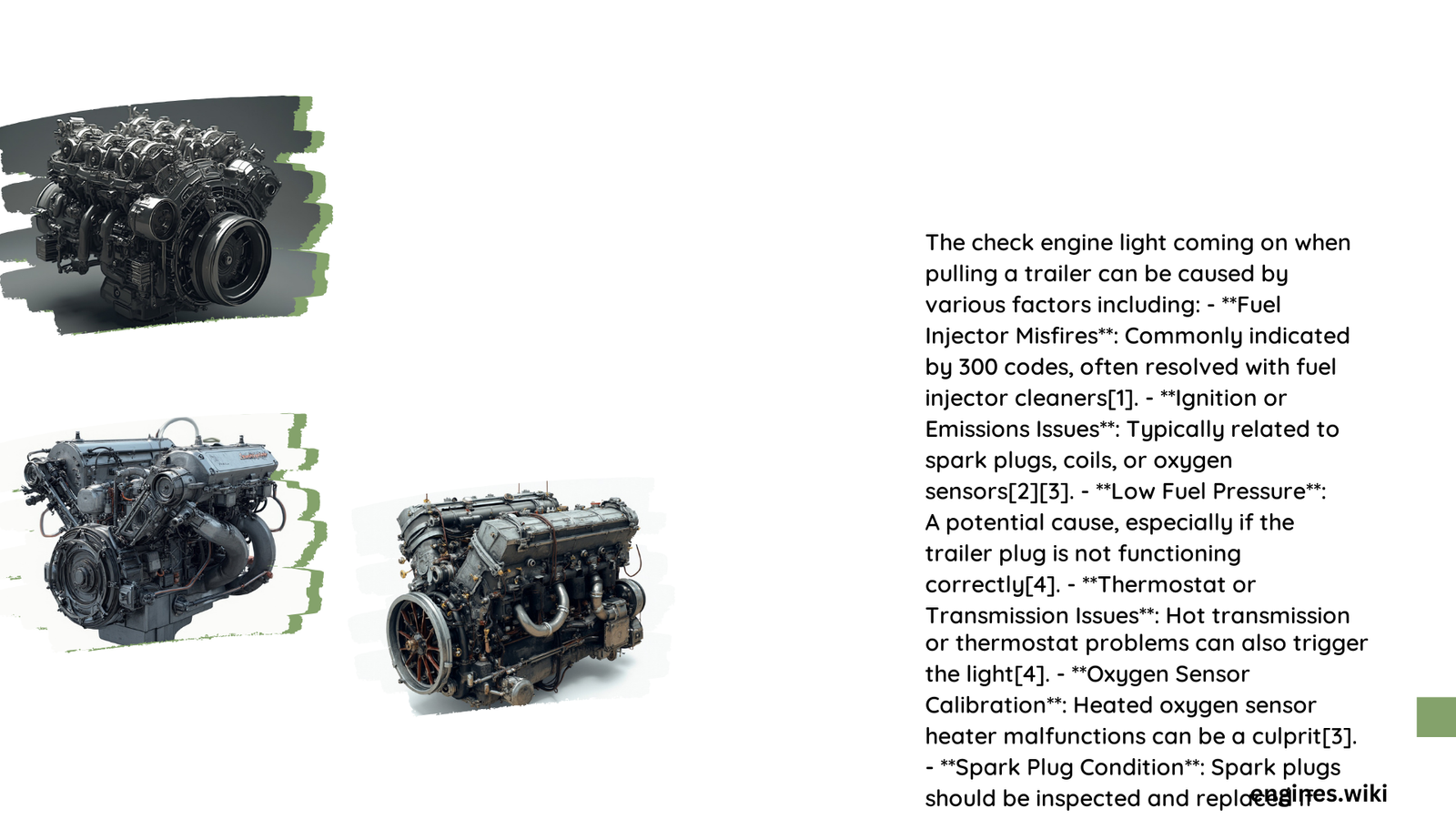When your check engine light comes on while pulling a trailer, it can be a cause for concern. This issue often stems from the increased stress on your vehicle’s engine and systems due to the added weight and load of towing. Common causes include overheating, transmission strain, and exceeded towing capacity. Understanding the reasons behind this problem and knowing how to address it can help you maintain your vehicle’s health and ensure safe towing practices.
Why Does the Check Engine Light Come On When Pulling a Trailer?
The check engine light is designed to alert drivers to potential issues with their vehicle’s engine or emissions systems. When towing a trailer, several factors can trigger this warning:
- Increased engine stress
- Higher transmission strain
- Elevated engine temperature
- Exceeded towing capacity
- Fuel system pressure changes
Let’s dive deeper into each of these factors and explore how they contribute to activating the check engine light while towing.
What Are the Most Common Diagnostic Codes When Towing?

When the check engine light illuminates during towing, specific diagnostic codes can help identify the issue. Here are some of the most frequent codes:
| Code | Description | Possible Cause |
|---|---|---|
| P0128 | Coolant Temperature Below Thermostat Regulating Temperature | Cooling system stress |
| P0133 | O2 Sensor Circuit Slow Response (Bank 1 Sensor 1) | Emissions system affected by load |
| P0401 | Exhaust Gas Recirculation Flow Insufficient Detected | EGR system issues |
| P0300 | Random/Multiple Cylinder Misfire Detected | Ignition timing or fuel delivery problems |
| P0420 | Catalyst System Efficiency Below Threshold (Bank 1) | Catalytic converter stress |
These codes can provide valuable insights into the specific issues your vehicle is experiencing while towing.
How Does Towing Capacity Affect the Check Engine Light?
Towing capacity plays a crucial role in preventing check engine light issues. Here’s how exceeding your vehicle’s towing capacity can lead to problems:
- Excessive engine strain
- Transmission overheating
- Suspension stress
- Brake system overload
- Increased fuel consumption
To avoid these issues, always adhere to your vehicle’s maximum towing capacity. For example:
- A 2020 Chevy Silverado 1500 with a 6.2L V8 engine has a maximum towing capacity of 14,500 lbs.
- A 2016 Dodge Ram 2500 with a 6.7L Cummins Turbo Diesel engine can tow up to 17,980 lbs.
- A 2013 Mercedes-Benz Sprinter’s towing capacity ranges from 5,000 to 7,500 lbs, depending on the configuration.
Exceeding these limits can trigger the check engine light and potentially cause damage to your vehicle.
What Diagnostic Procedures Should Be Followed?
If your check engine light comes on while pulling a trailer, follow these diagnostic steps:
- Use an OBD-II scanner to read the specific diagnostic codes.
- Check all fluid levels, belts, and hoses for any visible issues.
- Inspect the trailer wiring and connections for damage or malfunctions.
- If necessary, visit a professional mechanic for a thorough diagnosis.
These steps can help identify the root cause of the problem and guide you towards the appropriate solution.
How Can You Prevent the Check Engine Light from Coming On While Towing?
To minimize the risk of your check engine light activating during towing:
- Ensure your vehicle is properly maintained with regular service intervals.
- Stay within your vehicle’s maximum towing capacity.
- Use the correct towing equipment and ensure it’s properly installed.
- Monitor your vehicle’s temperature gauges while towing.
- Avoid sudden acceleration or braking when possible.
By following these preventive measures, you can reduce the likelihood of encountering check engine light issues while towing.
What Should You Do If the Check Engine Light Comes On During a Trip?
If your check engine light illuminates while you’re on the road with a trailer:
- Safely pull over to a secure location.
- Turn off the engine and allow it to cool down for a few minutes.
- Check for any obvious issues like loose connections or overheating.
- If safe to do so, restart the engine and see if the light remains on.
- If the light persists, consider reducing your speed or load if possible.
- Seek professional assistance if the issue continues or worsens.
Remember, ignoring a check engine light can lead to more severe problems and potentially dangerous driving conditions.
By understanding the causes of check engine light issues when pulling a trailer and following proper diagnostic and preventive measures, you can ensure safer and more reliable towing experiences.
References:
1. Check Engine Light while towing trailer | DODGE RAM FORUM
2. Engine warning light on-limp when mode towing trailer?
3. Check Engine Light After Towing | Chevy Silverado and GMC Sierra Forum
